|
|
|
Sort Order |
|
|
|
Items / Page
|
|
|
|
|
|
|
| Srl | Item |
| 1 |
ID:
172340
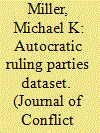

|
|
|
|
|
| Summary/Abstract |
How do autocratic ruling parties gain power? What predicts their durability and how they fall? This article introduces the Autocratic Ruling Parties Dataset, the first comprehensive data set on the founding origins, modes of gaining and losing power, ruling tenures, and other characteristics of autocratic ruling parties. It covers all ruling parties in the world from 1940 to 2015. Contrary to common assumptions, most ruling parties are not created by sitting dictators, but follow a range of paths to power that influence their style and duration of rule. To illustrate the data’s uses, the article confirms that ruling parties stabilize autocracies. Further, parties’ origins and histories matter, with revolutionary and foreign-imposed parties the most durable and parties empowered through elections the least durable. By recognizing ruling parties’ heterogeneity, histories, and potential autonomy from individual dictators, the data can contribute to open questions on autocratic politics, regime stability, and democratization.
|
|
|
|
|
|
|
|
|
|
|
|
|
|
|
|
| 2 |
ID:
172335
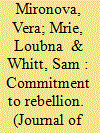

|
|
|
|
|
| Summary/Abstract |
What sustains commitment to rebel fighting during civil war? Using original survey data from the ongoing conflict in Syria, we examine whether self-ascribed rebel fighters, former fighters, civilians, and refugees can be clearly differentiated based on commitment to rebellion. We ask whether such groups are better characterized as a broadly holistic fighting community or a heterogeneous mix of actors with different levels of support for violence. Using a well-balanced sample of over 300 active and former rebel fighters, civilians from within the conflict zone, and externally displaced refugees, we observe that fighting commitment is greater among active combatants compared to other cohorts. To understand why, we examine underexplored psychological mechanisms and find that individuals with higher risk tolerance, optimism bias, and identity fusion with rebel forces display greater dedication to fighting. We discuss the implications of our results for understanding who participates in civil war violence and why.
|
|
|
|
|
|
|
|
|
|
|
|
|
|
|
|
| 3 |
ID:
172337
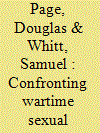

|
|
|
|
|
| Summary/Abstract |
Existing research on conflict-related sexual violence focuses on the motivations of perpetrators and effects on survivors. What remains less clear is how postconflict societies respond to the hardships survivors face. In survey experiments in Bosnia, we examine public support for financial aid, legal aid, and public recognition for survivors. First, we find a persistent ethnocentric view of sexual violence, where respondents are less supportive when the perpetrator is identified as co-ethnic and survivors are perceived as out-groups. Second, respondents are less supportive of male survivors than female survivors, which we attribute to social stigmas surrounding same-gender sexual activity. Consistent with our argument, those who are intolerant of homosexuality are especially averse to providing aid to male survivors. This study points to the long-term challenges survivors face due to ethnic divisions and social stigmatization from sexual violence.
|
|
|
|
|
|
|
|
|
|
|
|
|
|
|
|
| 4 |
ID:
172339
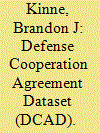

|
|
|
|
|
| Summary/Abstract |
The academic study of defense cooperation focuses heavily on formal military alliances. Yet, governments rarely sign new alliances, and the global alliance structure has remained relatively static for decades. By contrast, governments are increasingly active in defense cooperation agreements (DCAs). These bilateral framework treaties institutionalize their signatories’ day-to-day defense relations, facilitating such wide-ranging activities as defense policy coordination, joint research and development, weapons production and arms trade, joint military exercises, training and exchange programs, peacekeeping, and information exchange. Nearly 2,000 DCAs have been signed since 1980. Preliminary evidence suggests that DCAs impact numerous security, military, and defense outcomes and that governments increasingly incorporate DCAs as core elements of their security strategies. This article introduces the new DCA Dataset (DCAD). I provide a brief historical background on DCAs and compare them to other commonly studied forms of defense cooperation. I then explain coding standards and describe the data set in detail. Finally, I illustrate applications of DCAD to militarized interstate disputes and arms trade.
|
|
|
|
|
|
|
|
|
|
|
|
|
|
|
|
| 5 |
ID:
172338
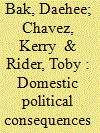

|
|
|
|
|
| Summary/Abstract |
Given the conventional claim that external threats increase internal cohesion and government capacity, cross-country studies have examined how interstate conflict events influence domestic politics. This article reevaluates the in-group and out-group mechanisms by examining how international strategic rivalry, which indicates the presence of persistent external threats even in the absence of military conflict, affects domestic political competition. An alternative explanation suggests that the effect of external threats on political incentives of domestic actors differs between regime supporters and oppositions. We posit that the presence of international threats from rival states inflames domestic unrest and oppositions’ antiregime challenges, while making governments rely more on repressive tactics given resource constraints and a high level of domestic political intolerance. In addition, we propose that the domestic consequences of international rivalry are heterogeneous depending on the characteristics of political systems and the level of threat perception. Empirical tests reveal robust evidence for the hypotheses.
|
|
|
|
|
|
|
|
|
|
|
|
|
|
|
|
| 6 |
ID:
172336


|
|
|
|
|
| Summary/Abstract |
Natural resource extraction is economically important in many developing countries, but social conflict can threaten the viability of the sector. This article examines why polluting extractive industries sometimes generate social mobilization but often do not. First, I distinguish acute, highly visible environmental externalities from chronic, less observable pollution, showing that only the former generate social mobilization. Second, I explore how high-quality local governance can mitigate the local resource curse dynamic by both reducing pollution and improving compensation in mining-intensive areas. The analysis uses microlevel data on extractive commodities, water pollution, children’s and livestock health, local government quality, and mining-related social conflict in Peru to demonstrate the full causal pathway of the local resource curse.
|
|
|
|
|
|
|
|
|
|
|
|
|
|
|
|
| 7 |
ID:
172334
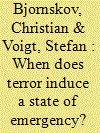

|
|
|
|
|
| Summary/Abstract |
The relationship between terrorist activities and states of emergency has never been explored in a cross-country perspective. This article is a first step to change that. Given that a terror act has been committed, what are the factors that lead governments to declare a state of emergency (SOE)—or refrain from declaring it? And given that a SOE has been declared, what are the effects thereof? On the basis of seventy-nine countries all having Western-style constitutions, we find that more terrorist incidents increase the likelihood of a SOE. Interestingly, emergencies are less likely to be declared in election years, supposedly because governments believe them to be unpopular. Once a SOE is declared, it generally leads to substantially more government repression. Finally, countries already under a SOE are more likely to suffer from additional terror attacks, challenging the effectiveness of states of emergency.
|
|
|
|
|
|
|
|
|
|
|
|
|
|
|
|
|
|
|
|
|